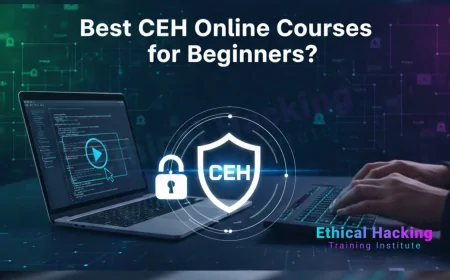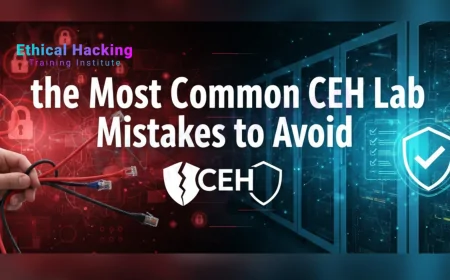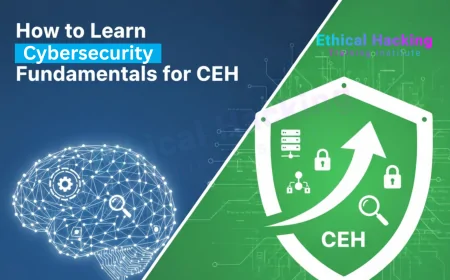Become a Certified Ethical Hacker: Steps to Kickstart Your Career | How to Start a Career in Ethical Hacking with the CEH Certification
Learn how to become a Certified Ethical Hacker (CEH) with this comprehensive guide. Discover steps, eligibility, exam pattern, costs, skills needed, and career paths to kickstart your ethical hacking career.

Table of Contents
- What is Ethical Hacking?
- Why Become a Certified Ethical Hacker?
- Eligibility Requirements for CEH
- Key Skills You Need
- Step-by-Step Guide to Becoming a CEH
- CEH Exam Pattern and Format
- CEH Certification Cost Breakdown
- Top Training Options
- Career Path After CEH
- Frequently Asked Questions
- Conclusion
What is Ethical Hacking?
It is the approved process of identifying vulnerabilities in digital infrastructure through simulated cyberattacks. Ethical hackers simulate the behavior of malicious attackers but with permission, aiming to secure digital environments from real threats. These professionals identify cyber risks using advanced techniques and report them in accordance with security protocols.
Why Become a Certified Ethical Hacker?
In today's cybersecurity landscape, CEH (Certified Ethical Hacker) certification is a globally recognized credential that showcases your ability to think and act like a hacker — ethically. Becoming CEH-certified can open doors to roles like:
- Penetration Tester
- Cybersecurity Analyst
- Security Engineer
- Information Security Consultant
With increasing data breaches, businesses are hiring ethical hackers to prevent costly attacks. CEH validates your skills and increases your credibility in the job market.
Eligibility Requirements for CEH
To become a Certified Ethical Hacker, you must meet one of the following:
- Complete official EC-Council CEH training (no experience required)
- OR have at least two years of proven work experience in the information security domain (plus an eligibility fee)
Basic networking knowledge, familiarity with Linux, and some scripting skills are helpful before attempting CEH.
Key Skills You Need
- Skilled in analyzing and working with essential network protocols, including TCP/IP and DNS.
- Knowledge of operating systems: Windows, Linux, macOS
- Familiarity with firewalls, IDS/IPS systems, and antivirus tools
- Proficiency in scripting: Bash, Python, or PowerShell
- Analytical mindset and problem-solving abilities
Step-by-Step Guide to Becoming a CEH
- Understand the Role: Gain hands-on experience using platforms like Hack The Box, TryHackMe, and EC-Council’s iLabs to simulate real-world attacks.
- Learn the Fundamentals: Start with cybersecurity basics, networking, and operating systems.
- Choose a CEH Course: Pick EC-Council-accredited training, online bootcamps, or self-paced learning platforms.
- Study Hard: Master subjects like footprinting, scanning, enumeration, system hacking, sniffing, malware, and cryptography.
- Practice in Labs: Use platforms like Hack The Box, TryHackMe, or EC-Council’s iLabs for real-world simulations.
- Register for the Exam: Enroll for the CEH test after verifying you meet the EC-Council’s requirements.
- Pass the CEH Exam: A passing score of 70% is required in the CEH exam, which includes 125 multiple-choice questions.
- Get Certified: Receive your CEH certificate and digital badge.
- Stay Updated: Ethical hacking tools and threats evolve constantly—keep learning!
CEH Exam Pattern and Format
- Exam Code: 312-50 (ANSI)
- Duration: 4 Hours
- Total Questions: 125
- Question Type: Multiple Choice
- Passing Score: ~70% (exact score varies by exam form)
CEH Certification Cost Breakdown
The cost of becoming a CEH can vary by country and training provider. Here's a general overview:
- Self-Study (Exam Only): ₹40,000 – ₹50,000
- Instructor-Led Training: ₹55,000 – ₹80,000
- iLabs Access (Practice Labs): ₹10,000 – ₹15,000
- Retake Fee (if required): ₹10,000+
Note: EC-Council also charges an eligibility application fee (~₹8,000) if you're applying without official training.
Top Training Options
WebAsha Technologies, Pune:
One of the leading CEH training providers in Pune, WebAsha Technologies offers EC-Council-accredited training programs with hands-on labs, expert instructors, and placement assistance. Their classroom and online batches are ideal for students and working professionals alike.
- EC-Council Accredited Training Partners (national & global)
- Udemy CEH Courses (affordable and flexible)
- Coursera & edX (foundational cybersecurity programs)
- EC-Council’s official iClass platform
WebAsha Pune Highlights:
- Official EC-Council Training Partner
- Real-time lab access & CEH exam guidance
- Instructor-led sessions by industry experts
- 100% job assistance for eligible candidates
- Flexible weekday and weekend batches available
Website: www.webasha.com
Choose the option that matches your learning style and budget.
Career Path After CEH
With CEH certification, you can pursue roles like:
- Penetration Tester
- Security Analyst
- Cybersecurity Consultant
- Vulnerability Analyst
- Security Architect (with experience)
With a few years of experience and further certifications (e.g., OSCP, CISSP), you can advance into high-paying leadership roles.
Frequently Asked Questions (FAQs)
1. What is the CEH certification?
The Certified Ethical Hacker (CEH) is a credential from EC-Council that validates your ability to identify and fix security vulnerabilities ethically.
2. Is CEH difficult to pass?
CEH requires solid preparation, especially if you’re new to cybersecurity, but it is manageable with dedicated study and lab practice.
3. What is the validity of CEH?
CEH certification is valid for three years. You can renew it through EC-Council’s Continuing Education (ECE) program.
4. Is CEH enough to get a job?
Yes, CEH can help land entry- to mid-level cybersecurity roles, but practical skills and continuous learning are equally important.
5. Can I do CEH without experience?
Yes, you can take the CEH course via EC-Council’s official training partners without needing prior work experience.
6. What’s the difference between CEH and OSCP?
CEH focuses on theory and tools, while OSCP emphasizes hands-on penetration testing and real-world hacking simulations.
7. How long does it take to prepare for CEH?
Preparation time varies, but 2–3 months of consistent study and lab practice is common for most learners.
8. Can CEH be done online?
Yes, you can complete CEH training and take the exam online through EC-Council’s iClass or authorized platforms.
9. What job roles can I apply for after CEH?
You can apply for roles like Security Analyst, Penetration Tester, Network Security Engineer, and more.
10. What is the CEH practical exam?
The CEH Practical is a separate hands-on test offered by EC-Council to prove your real-world skills.
11. What salary can I expect after CEH?
In India, entry-level salaries range from ₹4 LPA to ₹8 LPA. Internationally, it could be $60,000–$120,000 depending on experience.
12. Is CEH recognized globally?
Yes, CEH is a globally accepted cybersecurity certification, trusted by organizations worldwide.
13. What is iLabs in CEH?
iLabs is EC-Council’s virtual lab platform that offers hands-on practice with ethical hacking tools and techniques.
14. Does CEH require coding knowledge?
Basic scripting in Python or Bash is helpful but not mandatory. Most tools are GUI-based or CLI-driven.
15. What are the CEH exam domains?
Topics include Footprinting, Scanning, System Hacking, Malware, Cryptography, Social Engineering, and more.
16. How much does the CEH exam cost in the US?
In the U.S., CEH costs between $950 and $1,200 depending on the exam format and training package.
17. Are there any free resources to prepare for CEH?
Yes, sites like Cybrary, TryHackMe, and YouTube offer free tutorials. However, official materials are recommended for the exam.
18. How do I renew my CEH certificate?
Earn 120 EC-Council Continuing Education credits within three years to renew your certification.
19. Can college students apply for CEH?
Yes, students can apply through the official training path. It’s a great credential to add early in your career.
20. What is the CEH code of ethics?
Certified professionals must uphold EC-Council's Code of Ethics, which emphasizes integrity, confidentiality, and professionalism in cybersecurity practice.
Conclusion
Becoming a Certified Ethical Hacker is more than just earning a certification — it’s about adopting a mindset, sharpening technical skills, and committing to lifelong learning. In today’s cyber threat landscape, CEH can be your gateway into a rewarding and impactful career. Follow the steps outlined in this guide, stay motivated, and build real-world skills to stand out as a trusted cybersecurity professional.
What's Your Reaction?
 Like
0
Like
0
 Dislike
0
Dislike
0
 Love
0
Love
0
 Funny
0
Funny
0
 Angry
0
Angry
0
 Sad
0
Sad
0
 Wow
0
Wow
0


















